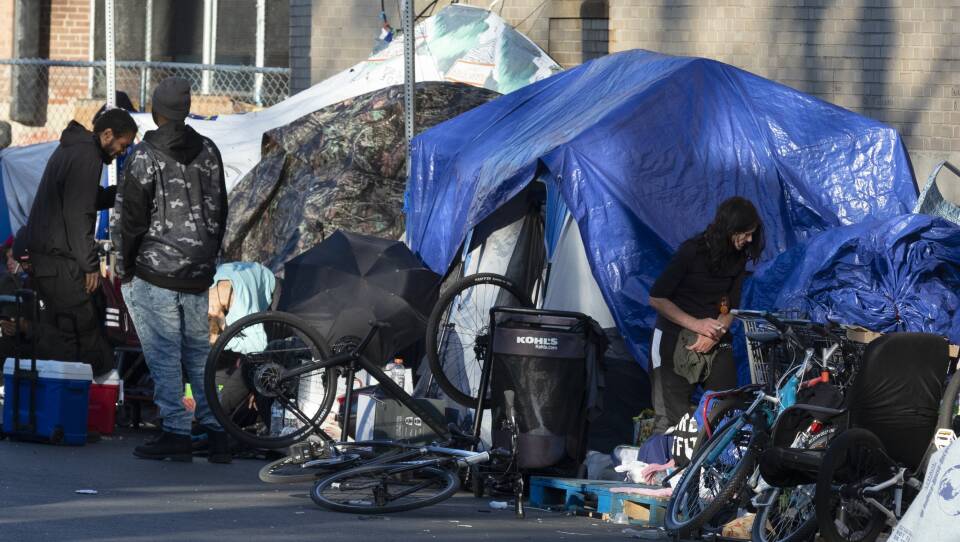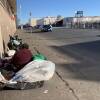Mayor Wu's decision to clear the encampment along the Mass. And Cass corridor by Jan. 12 is sparking mixed reactions from those who call the streets home and from some advocates. Meanwhile, Governor Baker is facing mounting pressure to reinstate an indoor mask mandate as case numbers rise. GBH News politics reporter Adam Reilly and City Hall reporter Saraya Wintersmith joined host Marilyn Schairer on Morning Edition today to discuss the latest developments. This transcript has been edited for clarity and length.
Marilyn Schairer: Let's start with Mass. and Cass. Saraya, you've been covering this extensively. Mayor Wu says by next month, those living in tents on the streets will be sheltered. What's the plan and how viable is it? What can you tell us?
Saraya Wintersmith: I think it's a big move from the new administration to give themselves a deadline for solving a problem. The plan right now is to relocate the population that's concentrated in the Mass. and Cass area and split them up and put them into shelters sites, various low threshold shelter sites across the city. That low threshold means they'll have the sort of mental health and addiction supports that they may not otherwise have, and they won't be asked, in the way that they will at existing shelters, they won't be asked to give up some of those addictive behaviors that they're struggling with.
Right now, [the plan is] the Roxbury Roundhouse, the Shattuck Hospital in Jamaica Plain and the EnVision Hotel in that space where Jamaica Plain and Mission Hills sort of meet. These are the three sites that equal out to about 130 beds. It's just shy of the 200 goal that Wu said she wanted to have available by this time. But the administration says there are more sites slated to come online as more specialists become available to work within the sites.
And then, Marilyn, in terms of viability that's still being debated. Adam and I were just talking and we were saying, this is one of those issues where folks make a move in one direction, and it sparks some concern in one segment of the population. And then another move is made, and yet again, there is more concern from somewhere else.
Schairer: And what is the concern? How are those locations selected?
Wintersmith: I think that for the Roundhouse, it's right there in the area. It was part of the solution during the height of a pandemic. I think that Frank Baker, the Dorchester city councilor whose district intersects with the area, has raised a number of concerns about this. He says that he believes if he were mayor, he would pursue a sort of treatment first model. Obviously, we know that it's very rare that we can force any individual to take on treatment that they do not want to take. But he sort of disagrees with the mayor and her philosophy that finding housing and providing somebody with a safe place to be, sort of undergirds all of the other issues that one might be facing. In other words, once you secure some housing, you can go ahead and start working on a job, addiction treatment, connection back with families. So there's a fundamental disagreement there.
And the only thing that I will add — I think some of the community discontent with the locations and what it means to absorb a high needs population within a community so quickly. I think if the administration maybe would have been a bit more straightforward about the plan — you will recall that the first time that we heard about this plan, I think it was the Boston Herald who got wind of it because community members were concerned. I think Wu is a new mayor, and we'll have to see whether or not she means to pursue shopping out plans at a community level without answering press questions first. But I think the way that she went about it means that we were almost certainly going to hear complaints rather than support.
Schairer: Adam, I know you want to jump in there. What do you want to say?
Adam Reilly: I would just say, the people who live in the neighborhood have very understandable concerns because on a daily basis, they see stuff that most of us never encounter. I remember interviewing one woman who talked about how she's seen a dead body in a park and had to shield children from that. Conversely, when acting Mayor Janey tried to clear people from the area, the ACLU hopped in and said, "wait a minute, these are people's homes. You can't just treat these people like they're widgets effectively." So — a lot of stakeholders with a lot of different ideas about the way things should be done.
Schairer: Let's get to the mask mandate. The CDC Director Rochelle Walensky said during a White House briefing yesterday that omicron cases are doubling every two days. We're seeing more and more cases here in Massachusetts and in Boston . Some of those people were not vaccinated. Adam, what about the governor? Why is he holding off on renewing a mask mandate? Do you think he'll change his mind?
Reilly: As we look back over the course of this pandemic, the governor, I think, has often been slow to take the aggressive action that some people want him to take on a state level. I used to think that it was because he was thinking about running for a third term and had to keep in mind that he would need to get through a Republican primary and the people are very averse to government overreach, or what they perceive as government overreach.
Now, of course, he's not running. I think in retrospect, the governor is just a big believer in letting municipalities make these decisions — that he doesn't think the state should be dictating for cities and towns what they should do, that they should take the lead as a rule. Not always.
I do also think there might be a personal component. The governor has talked at times about how much better off we are now than we were a year ago or a year and a half ago. And I do think on a personal level, it would be kind of tough to feel like you've worked hard to get the state to make all this progress on vaccination, recovering economically, and then to go back and say, "unfortunately, we need everyone to mask up again." I do think that it'd be hard personally. I don't know if that's a conscious consideration for him, but I would guess it's playing in there somewhere.
"The governor is just a big believer in letting municipalities make these decisions."-Adam Reilly
Schairer: Let's just touch upon the Lydia Edwards, the Democratic nominee for the upcoming state Senate race , a Boston city councilor. That means if she wins the election, she'd leave the Boston City Council. What does that mean? How will the council look after?
Wintersmith: Marilyn, this would mean that in addition to losing Mayor Wu last month, Kim Janey, Annissa Essaibi George, Andrea Campbell, Matt O'Malley and Lydia Edwards — six councilors represent a huge outflux of knowledge and experience on the council. And that says nothing of at-large Councilor Michael Flaherty's name being in the mix for the D.A. position. If he leaves, that would be the majority of the council out and new councilors in
Schairer: And a major turnover. What would that indicate for the city?
Wintersmith: That would mean that in addition to some of the new councilors who are rumored to have secured committee assignments in a deal to elect Ed Flynn as council president, we will have new council members leading new processes. You remember the voters of Boston approved a budget process change , which means the council has a bit more power against the mayor this time. The council is also going to decide the future of the Boston School Committee based on the results of the advisory ballot question that we saw. So they're going to be at the center of politics.










